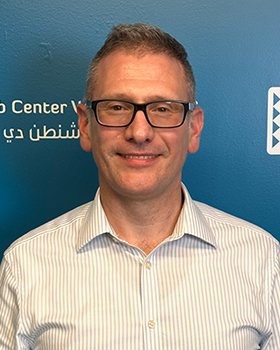
Speakers

Mohamed Daadaoui
Professor of Political Science; Chair of Political Science, History, and Philosophy & Rhetoric, Oklahoma City University

Aicha Elbasri
PhD Researcher, Political Studies Unit, Arab Center for Research & Policy Studies (ACRPS)

Samia Errazzouki
Mellon Postdoctoral Fellow, Department of History, School of Humanities and Sciences, Stanford University

Riccardo Fabiani
Interim Program Director, Middle East and North Africa; Project Director, North Africa, International Crisis Group
Moderator
About the Webinar
Morocco is undergoing a momentous period of heightened domestic contestation and shifting geopolitical configuration. Since late September 2025, youth-led demonstrations have surged over rising unemployment, persistent social inequality, and declining public services, particularly in health and education. Protesters have also criticized the government’s allocation of resources to international sporting events, including preparations for the 2030 FIFA World Cup, as emblematic of misplaced priorities. While the state has announced administrative reforms in response, their effectiveness remains uncertain, and deeper questions of accountability and structural inequality continue to resonate.
At the same time, Morocco’s foreign policy has been increasingly defined by its pursuit of international recognition of sovereignty over Western Sahara, a priority that impacts both regional diplomacy and domestic legitimacy. The country’s normalization of relations with Israel in 2020—linked to US recognition of its Western Sahara claims—has further complicated the domestic political landscape, raising questions about the intersection of foreign policy bargains and internal discontent. The most recent United Nations Security Council (UNSC) resolution on Western Sahara underscores the salience of this issue in Morocco’s regional and international calculations.
Arab Center Washington DC is convening a panel of experts to discuss Morocco’s recent youth-led mobilizations, their implications for democratic governance, and the prospects for socio-economic equality and political reform. The discussion will situate Morocco’s current moment within broader debates on authoritarian resilience in the Middle East and North Africa, democratic transitions, and shifting geopolitical dynamics. To what extent do the government’s response and pledges for reform address the underlying challenges and structural inequality? What are the prospects for political reform in Morrocco? What is the impact of Morocco’s foreign policy on its domestic legitimacy? What are the internal and regional implications of Morocco’s normalization of relations with Israel? What is the significance of the recent UNSC resolution on the Western Sahara? Does Morocco’s current moment signal the consolidation of authoritarian rule or the opening of new democratic possibilities? How are domestic contestation, governance reforms, and foreign policy choices shaping the country’s role in Africa, the Middle East, and globally?
Featured image credit: Wikimedia Commons/Mounir Neddi


